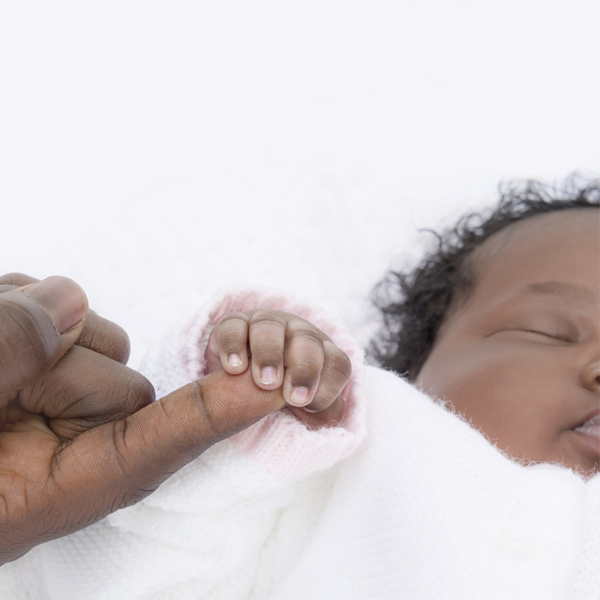Insights
An African-American Fraternity Alliance is Changing Infant Health Outcomes

In Arkansas, nearly 300 babies die before their first birthday each year. That’s almost a baby every day. These deaths are accompanied by troubling racial disparities that reflect a national trend where African-American babies are dying at nearly twice the rate of white babies.
Determined to change these numbers and reach communities most affected, the Arkansas Department of Health’s Office of Minority Health and Health Disparities turned to a nontraditional partner for maternal and infant health: Brothers United, an alliance of African American fraternities including Alpha Phi Alpha, Kappa Alpha Psi, Omega Psi Phi, Phi Beta Sigma and Iota Phi Theta.
“We wanted to connect with a copartner firmly rooted in the African-American community,” says Michelle R. Smith, PhD, MPH, Director of the Office of Minority Health and Health Disparities. “The fraternities in Brothers United have robust, active alumni chapters already conducting health initiatives in their communities, which means they have the right infrastructure and the right audience. They’re committed to the health of their community and were eager to partner with us to inspire change in their state.”
Arkansas is one of four state teams participating on the Safe Sleep CoIIN—an initiative that seeks to improve infant safe sleep practices and reduce disparities. The Safe Sleep CoIIN is an opportunity for states to build on the findings and lessons learned from the Infant Mortality CoIIN’s Safe Sleep Learning Network, both from their own work and from states across the nation.
To support Brothers United’s outreach efforts, Shakia Jackson, Sisters and Brothers United Coordinator with the Office of Minority Health and Health Disparities, leads intensive training sessions on infant mortality that review prevention strategies and provide materials for the chapters to share in their communities. These materials are reviewed by the Safe Sleep CoIIN team so that attendees benefit from the most up-to-date and accurate information. The trainings specifically focus on two strategies proven to reduce infant death: promoting safe sleep behaviors and supporting breastfeeding mothers.
“Sudden infant death syndrome (SIDS) and accidental suffocation are two major causes of infant death and each can be minimized by better outreach to families,” explains NICHQ Associate Project Director Emma Smizik, MPH. “If we help mothers breastfeed, we can reduce the risk of SIDS; if we help more families understand safe sleep practices, we can reduce the risk of suffocation. Groups like Brothers United, with active members in their communities, can play a vital role in outreach efforts. They are trusted messengers for change.”
After completing the trainings, Brothers United members become change agents in their communities, hosting educational events that activate men as key community stakeholders for improving infant health outcomes.
“A lot of the messaging around safe sleep and breastfeeding seems to be directed at, or come from, women,” says Ray Walker, Brothers United and Pine Bluff Alumni Chapter member and Administrative Assistant for the Southern Region of Arkansas Kappa Alpha Psi Fraternity, Incorporated. “But we—fathers, grandfathers, uncles, friends, teachers, parishioners—all play an important role in keeping our babies safe. These events help the men in our community understand that role while arming them to make an impact, whether by supporting their partners in breastfeeding, helping their babies to sleep safely or raising awareness in their community.”
To help target the men in their communities, alumni chapters host “Tailgate Parties,” a twist on a baby shower for new and expectant fathers that uses innovative games to teach attendees about safe sleep and how to be supportive of breastfeeding partners. One game helps attendees identify a proper latch-on for breastfeeding, while another helps attendees recognize unsafe sleep environments. Participants also spend time talking with each other, sharing concerns and asking questions—ultimately developing a community of African-American men committed to using knowledge as a vehicle to inspire change.
“We perish by not knowing,” says Walker. “When we saw the disparities of African-American babies against white babies, when we learned about the simple steps that can change those numbers, we realized that what we had not known was endangering our children and the children throughout our communities. Realizing that we could do more to keep our babies safe will have a perpetual impact on our community.”
The future potential of participating fraternities’ outreach is significant. For example, Kappa Alpha Psi has begun to extend their education efforts to their undergraduate chapters, recruiting a whole new set of safe sleep and breastfeeding allies. Moreover, they’ve partnered with the University of Arkansas at Pine Bluff’s Early Head Start-Child Care, which serves children across Southeast Arkansas. The fraternity is working to develop a safe sleep and breastfeeding information packet that can be shared at participating childcare centers.
“Brothers United is one of our strongest partners,” confirms Erin Gildner, team lead on Safe Sleep CoIIN. “Their successes show just how effective a safe-sleep partnership with African-American fraternities can be. By spreading their work, we can reduce infant health disparities across the nation.”
Looking for more ideas for improving safe sleep education and outreach? Check out NICHQ’s video quiz, How Safe Sleep Savvy Are You?, a tool for helping health professionals engage caregivers in conversations about safe sleep recommendations.
Interested in starting a partnership with fraternities or sororities in your state? Email the [email protected] for more information.
